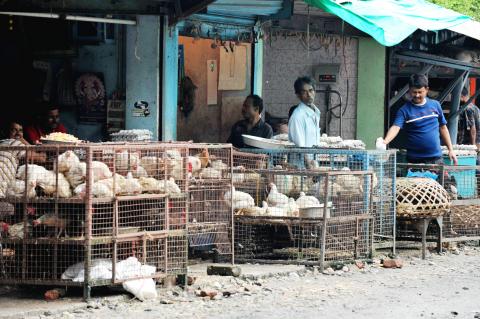Closing live poultry markets, though a huge economic setback, is a sure-fire way of curbing H7N9 avian flu in the case of an outbreak, disease control researchers said yesterday.
The closure of 780 live poultry markets (LPMs) in the Chinese cities of Shanghai, Hangzhou, Huzhou and Nanjing in April reduced the daily number of H7N9 infections by more than 97 percent, a study in the Lancet medical journal said.
“Our findings confirm that LPM closure is a highly effective intervention to prevent human disease and protect public health,” study lead author Benjamin Cowling of the University of Hong Kong said in a statement. “Without this robust evidence, policymakers would struggle to justify further closures of LPMs because of the millennia-old culture of trading live birds and the potential huge economic loss on the poultry industry in China.”

Photo: AFP
The study said losses associated with the closures in April have been estimated at about 57 billion yuan (US$9 billion).
A total of 137 people have been infected by the virus since February and 45 have died.
Live poultry markets are common in China and countries such as Thailand, Laos and Singapore, and present an ideal environment for virus spread between birds held together in very high concentrations.
The researchers had collected information about every laboratory-confirmed human case of H7N9 infection in the four cities over several months and constructed a statistical model showing the before-and-after effect of market closure.
The team found the closures reduced the average daily number of infections by 99 percent each in Shanghai and Hangzhou, and by 97 percent in Huzhou and Nanjing — and rapidly.
They also looked at the potential effects of other factors such as a change in humidity, but found nothing else that could explain the sudden drop.
Cowling said two new cases of H7N9 identified in China’s eastern Zhejiang Province this month were of “great concern” as they showed the virus had continued to circulate and had the potential to cause a new outbreak in the fall-winter flu season.
The team said local authorities must immediately close poultry markets in affected areas in the case of future outbreaks.
“In view of the potentially huge adverse economic effect of LPM closure, prompt and unanimous support of public health practitioners and clinicians for this necessary intervention will be paramount to protect human health from the... threat of avian influenza A H7N9 virus,” they wrote.
Avian flu viruses have been around for a very long time in wild birds, but they do not generally cause disease in humans, though in rare cases they mutate and jump species.
Strains of the H5, H7 and H9 avian influenza subtypes have caused human infections, mainly following direct contact with infected poultry. None of the strains have yet mutated to become easily transmissible from person to person — the epidemiologist’s nightmare.
The best-known strain is the H5N1 virus which has caused 633 confirmed flu cases in humans in 15 countries from 2003 to July this year. Of these, 377 died — a death rate of about 60 percent.

STEPPING UP: Diminished US polar science presence mean opportunities for the UK and other countries, although China or Russia might also fill that gap, a researcher said The UK’s flagship polar research vessel is to head to Antarctica next week to help advance dozens of climate change-linked science projects, as Western nations spearhead studies there while the US withdraws. The RRS Sir David Attenborough, a state-of-the-art ship named after the renowned British naturalist, would aid research on everything from “hunting underwater tsunamis” to tracking glacier melt and whale populations. Operated by the British Antarctic Survey (BAS), the country’s polar research institute, the 15,000-tonne icebreaker — boasting a helipad, and various laboratories and gadgetry — is pivotal to the UK’s efforts to assess climate change’s impact there. “The saying goes

Floods on Sunday trapped people in vehicles and homes in Spain as torrential rain drenched the northeastern Catalonia region, a day after downpours unleashed travel chaos on the Mediterranean island of Ibiza. Local media shared videos of roaring torrents of brown water tearing through streets and submerging vehicles. National weather agency AEMET decreed the highest red alert in the province of Tarragona, warning of 180mm of rain in 12 hours in the Ebro River delta. Catalan fire service spokesman Oriol Corbella told reporters people had been caught by surprise, with people trapped “inside vehicles, in buildings, on ground floors.” Santa Barbara Mayor Josep Lluis

Police in China detained dozens of pastors of one of its largest underground churches over the weekend, a church spokesperson and relatives said, in the biggest crackdown on Christians since 2018. The detentions, which come amid renewed China-US tensions after Beijing dramatically expanded rare earth export controls last week, drew condemnation from US Secretary of State Marco Rubio, who on Sunday called for the immediate release of the pastors. Pastor Jin Mingri (金明日), founder of Zion Church, an unofficial “house church” not sanctioned by the Chinese government, was detained at his home in the southern city of Beihai on Friday evening, said

TICKING CLOCK: A path to a budget agreement was still possible, the president’s office said, as a debate on reversing an increase of the pension age carries on French President Emmanuel Macron yesterday was racing to find a new prime minister within a two-day deadline after the resignation of outgoing French Prime Minister Sebastien Lecornu tipped the country deeper into political crisis. The presidency late on Wednesday said that Macron would name a new prime minister within 48 hours, indicating that the appointment would come by this evening at the latest. Lecornu told French television in an interview that he expected a new prime minister to be named — rather than early legislative elections or Macron’s resignation — to resolve the crisis. The developments were the latest twists in three tumultuous